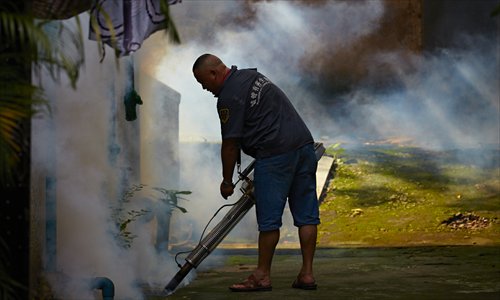Man-made solution for dengue
Scientists release infected male tiger mosquitoes to cut population

A staff member from the disease prevention authority in Guangzhou, Guangdong Province, sprays chemicals to kill mosquitoes earlier this month. Photo: CFP
On March 12, Chinese scientists started to release 70,000 to 100,000 male mosquitoes twice each week on an island in South China's Guangdong Province. So far, they have released half a million.
Each time, scientists drove motor tricycles around the dozens of release areas, and released mosquitoes from several hundred small cages. Villagers frequently ask for mosquito cages to help scientists release them.
The male mosquitoes are infected with wolbachia bacteria, which after mating leads to eggs in female mosquitoes not hatching.
This is a trial launched by the Sun Yat-sen University-Michigan State University Joint Center of Vector Control for Tropical Disease to counter dengue fever by reducing the population of dengue-transmitting mosquitoes. It is the first such trial in China.
Dengue fever, a mosquito-borne viral infection, has put half of the world's population at risk. At present, the only method to control and prevent the spread of the dengue virus is to combat infected mosquitoes.
Outbreak risk
China risks a severe dengue fever outbreak this year due to the continuing increase in cases in surrounding countries, and persistent high temperatures and rainy days in South China, Chen Xiaoguang, deputy head of the School of Public Health and Tropical Medicine at Southern Medical University, told the Global Times.
China witnessed the worst dengue outbreak in a decade in 2014. There were 37,000 cases and six deaths in the hardest hit Guangdong.
There is no effective treatment for dengue fever worldwide. Dengue patients usually suffer from flu-like illness, and occasionally develop other complications, according to Chen.
"So far, the exact reason of last year's outbreak is still under investigation," Chen said, adding that Chinese scientists are sequencing the genes of the dengue virus to detect variations.
The global incidence of dengue has grown dramatically in recent decades. Cases across the Americas, Southeast Asia and the Western Pacific increased from 1.2 million in 2008 to over 3 million in 2013, according to WHO data.
The Aedes albopictus, or tiger mosquito, is a vector of dengue that can be found in urban areas in South China. China combats these mosquitoes by cleaning up sewage and stagnant water, in order to curb the development of the insect larvae, Chen said.
"However, the approach does not work well in Guangdong due to frequent rain."
Gender imbalance
China is the fourth country getting approval by governments for the trial using infected male mosquitoes, after the US, Australia and Vietnam. The first location for testing was Shazai island in the Nansha district of Guangzhou.
Before the release of mosquitoes, the joint center surveyed 455 residents on the island for their opinions and 453 of them welcomed the trial.
Scientists installed over 100 monitoring stations on the island to measure the changes of the insects' population, and found that the mosquito population had dropped by half as of early June, said Xi Zhiyong, director of the joint center. His goal is to reduce by 90 percent the tiger mosquito population on the island.
Xi said that the mosquitoes released were cultivated in their lab, and each week the lab could breed about 100,000 new male mosquitoes.
Tiger mosquitoes account for 10 to 20 percent of the total mosquitoes on the island, and male mosquitoes infected with wolbachia will easily find and mate with them.
"The male mosquitoes that mated with females without wolbachia are likely to sterilize them," Xi said.
Xi is collecting more evidence to prove the method is effective. "We expect more large-scale releases in the future, and expect the weekly production of male mosquitoes to reach 1 million," Xi said.
But mass rearing of the male mosquitoes with wolbachia remains a challenge for scientists, said Zheng Xiaoying, a research fellow with the joint center. After scientist reduced 90 percent of the Aedes albopictus mosquitoes, they will release a few female mosquitoes with wolbachia to replace the dengue-infected population, Zheng told the Global Times. He said that if the trial proves successful, it would be attempted in more regions in China.
However according to Lu Yongyue, a professor with the South China Agricultural University, continuing the trial will not be feasible in long term. It requires the long-term release of mosquitoes, and also a large investment in mosquito production, Lu told the Global Times.
"Some places may need the release of mosquitoes for 20 consecutive years to prove its effect," Lu said.
"Even if the trial proves wolbachia's effect in controlling the population of insects, tackling dengue fever still relies on the government's comprehensive measures in cleaning the environment," he said, adding that sewage offers living conditions for 90 percent of the mosquitoes.
Regulating genes
Controlling the population of mosquitoes by using wolbachia has achieved success in other countries like Australia, but whether it will achieve the same effect in China remains unknown due to species differences, Zheng said.
Scientists in different countries are trying different measures to control mosquitoes and other insects. Chen and several other US scientists recently proved that mosquitoes could be regulated by altering their DNA.
"If we inject the gene into a bunch of female tiger mosquitoes, 75 percent of their offspring will be male. And after four such cycles, all the mosquitoes will be male," Chen said. Only female mosquitoes bite human beings and spread viruses.
There are over 3,000 kinds of mosquitoes globally, and over 300 of them live in China, Chen said.
But the tiger mosquito does not attach too much importance to the ecological balance, Chen said.
Controlling insects through sterilization has been also applied to flies.
Lu plans to use wolbachia to sterilize syrphids, but finding an effective wolbachia that could exist in their offspring is very difficult, he said.